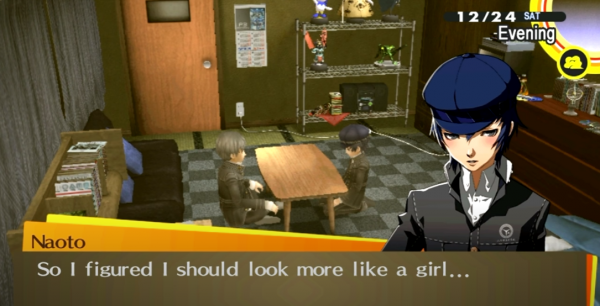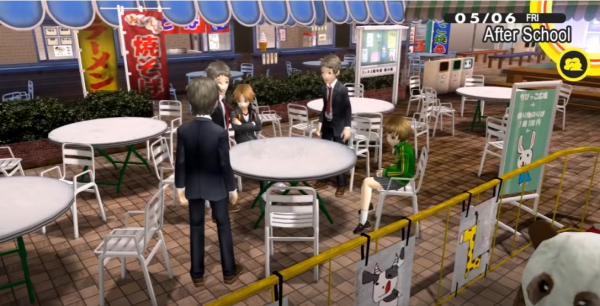Since its release in 2008, Persona 4 has been a bastion of modern RPGs, solidifying itself in gaming canon with not one but two anime adaptations, a rhythm game, two fighting games (that pleasingly connect to its predecessor, Persona 3) and a wildly successful follow-up in Persona 5. Fans have waited years for a PC port of Persona 4 Golden, an enhanced re-release originally for PlayStation Vita with hours of new content, not only because many in Western markets did not own Vitas but because of the possibilities that a PC version presented.
For the uninitiated, the Persona series is a spin-off of the popular Shin Megami Tensei series. Persona built off of Shin Megami Tensei’s fascination with world religions by fusing Christian, Shinto, and Greek mythologies with Jungian psychology. As opposed to taking place in a post-apocalyptic Tokyo rife with doomsday cults, Persona is set in modern day Japan and concerns a cast of troubled highschoolers who, through mysterious means, gain access supernatural manifestations of their psyche which take the forms of Gods and demons. Since Persona 3, the game has been a hybrid of dungeon crawling, turn-based JRPG and life sim—the player must balance leveling up their team while performing well on exams, charming your peers, and solving urban legends Scooby-Doo style.
Persona 4 was the first game that didn't take place in a big city. The unnamed protagonist moves to the rural town of Inaba to live with his uncle -- a detective -- for a year while his parents work abroad. There, he becomes embroiled in a national scandal after an anchorwoman who recently received tabloid attention for her affair with a city councilman. She is later found dead in a local Inaba inn. Not long after, an upperclassman turns up dead and other students begin to go missing after their appearance on a secret TV channel that only airs at midnight. Persona 4 seamlessly adds murder mystery tropes to the already eclectic conventions of the Persona series, which sets it apart as a truly unique experience.
Since Persona 4, the franchise has been almost inextricable from discourse surrounding its often conservative writing despite centering stories of non-conformity and self-acceptance. Most notably, Persona 4 features two characters, Kanji Tatsumi and Naoto Shirogane, who seemingly toy with queer anxieties in small town settings that, ultimately, go nowhere. Kanji’s homosexuality yields into an interesting but tepid exploration of masculinity. Naoto, who initially is posited as a transgender man, is blatantly mistreated—to initiate her romance, you have to tell her, “I’m glad you’re a girl,” and protect her instead of fighting alongside her in one of her social links. Later, you’re able to encourage her to wear a female school uniform to school, which she is visibly uncomfortable with.
Sadly, Persona’s often contradictory portrayal of women and queer characters did not improve by Persona 5. Because of an outpouring of complaints, Atlus altered some scenes in Persona 5 Royal’s Western release which depicted two gay men sexually harassing Ryuji Sakamoto, one of the game’s central cast members. Yu Namba, Royal’s Western localization senior project manager, defeatedly told Gamespot, “I really cannot do too much about what has already made it into the game.” These scenes were preserved in the Japanese release, so the localization team had to work around this scene still occurring, instead playing it off as if the two older gay men wanted to put Ryuji in drag for the first time. An attempt was made, but Ryuji is still portrayed as fearful of queer sexuality.
Given Persona’s huge Queer fanbase, a PC port presents the rare opportunity to give players the chance to make the changes that Atlus is too anxious to make themselves. One mod has received significant attention for restoring a supposedly scrapped romance for party member Yosuke Hanamura, which fans discovered from digging in the English localization’s unused voice lines. Yosuke’s romantic relationship with the protagonist is by far the most popular in Persona 4’s fandom—there are over 2000 fanworks for the pairing on Archive of our Own split between a few tags.
“Right now I have the rank 10 done except audio, Rank 6 decently finished, and a WIP Christmas eve event which is wonky because animation params are hard to figure out,” mod creator MadMax1960 told me via DM. “I do plan on making more story mods,” they told me, referring to the cringe-inducing requirements to achieve Naoto’s Christmas Eve scene. “Further down the line, I plan on making/expanding social links and cutscenes with more dialogue.”
One look at P4G’s page on modding site Game Banana yields over a hundred mods, with several being edited and added every day. Many of these are very minor changes—one of my favorites replaces a common town theme with the Morioh Radio song from part four of Jojo’s Bizarre Adventure, of which Persona 4 shares (suspiciously so) numerous similarities. Others are purely humorous, such as replacing every model with Adachi’s or changing all the fonts to Comic Sans.
“The game is more accessible, and actually pretty easy to mod when you get into it,” MadMax told me. Just a couple days after P4G went live on Steam, they posted a Beginner’s Guide for modding the game and using TGE’s Modloader. “I think it's nice my mods have gotten attention, but I still mostly just make guides to help people and figure out small stuff that I think is interesting. TGE is the main guy who's developed tools for Persona modding the past few years.”
There’s a certain chaos to the process, particularly given how niche modding JRPGs is in relation to Western RPGs like Skyrim and Dragon Age, which collectively have a couple billion downloads from Nexus Mods. “This is now my favorite and most recommended mod,” they said, linking to a mod they submitted several hours after our conversation. The description just reads “You need to switch to the beta version for it to work, which means on base game it'll crash.”
While the Yosuke mod may be in its early stages, it gestures towards a lively fan community revising alienating elements of beloved games. This practice has been alive and well since the ‘90s, particularly in “fix it” fanfiction and doujinshi communities, but with many JRPGs arriving on PC for the first time, fans are able to splice games and reclaim them in personal ways without having to rely on corporations to budge. (Here’s hoping for a Kanji romance mod to follow.)
For now, I’m happy exploring P4G mostly in its original format. I never owned a Vita, so I never got to experience Scooter Attacks, gardening with Nanako, Adachi’s social link, and so many other additions. The one mod I might recommend for any player, especially those that have only played Persona 5, is the Inactive Party Members XP mod. It even comes with a scale so you can adjust exactly how much XP the inactive party members receive. It’ll save hours of grinding and is a worthy quality of life improvement that probably could have been in P4G to begin with.
Mods or not, P4G for PC is the definitive Persona 4 experience and is worth exploring whether it’s your 10th playthrough or your first.



